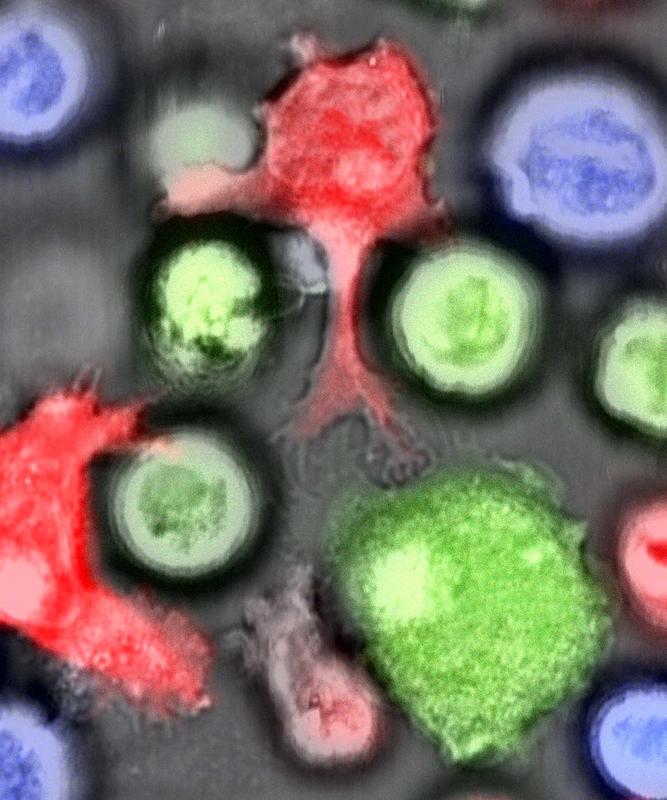

Natural killer cells (red) attack normal leukemia cells (green) but not leukemia stem cells (blue).
Image: University of Basel, Department of Biomedicine, Christoph Schürch
Patients treated for acute myeloid leukemia (AML) often achieve remission but then later experience relapses due to surviving subpopulations of leukemia stem cells. The researchers report that these leukemia stem cells or cancer stem cells are not only more resistant to chemotherapies, but can also selectively evade destruction by immune cells: although they exhibit the same cancer-specific genetic mutations as other cancer cells of the same patient, leukemic stem cells have additional stem cell-specific mechanisms of immune defense, which they use to ensure their survival.
Immune evasion using an enzyme
For example, the cancer stem cells suppress the surface expression of ligands of the danger detector NKG2D in order to evade natural killer cells. This specific mechanism of immune evasion is mediated by the formation of the enzyme PARP1 in the cancer stem cells, as the researchers report.
Treatment with PARP1 inhibitors can induce NKG2D ligands on cancer stem cells, and pre-clinical trials on mice have shown that immune cells can eliminate cancer stem cells following treatments of this kind.
Cancer therapies incorporating the immune system have been applied successfully for many years in the form of allogeneic stem-cell transplants to patients with leukemia in certain disease situations. In recent years, further immunotherapeutic approaches have been developed for leukemia as well as other cancers.
“However, our results indicate that – as with chemotherapy – cancer stem cells are also better at surviving immune attacks,” says study leader Professor Claudia Lengerke. The effectiveness of immunotherapies could therefore be improved if they were used in combination with treatments that sensitize cancer stem cells to immunological attack.
The study was conducted by the teams led by Professor Claudia Lengerke (Department of Biomedicine and Department of Hematology at the University of Basel and University Hospital Basel), Professor Helmut Salih (German Cancer Consortium Heidelberg, partner site Tübingen) and Professor Andreas Trumpp (University of Heidelberg and German Cancer Research Center, Heidelberg), in collaboration with other scientists.
Prof. Dr. Claudia Lengerke, Department of Biomedicine, University Hospital and University of Basel, Tel. +41 61 265 23 81, E-Mail: claudia.lengerke@unibas.ch
Anna M. Paczulla, Kathrin Rothfelder, Simon Raffel et al.
Absence of NKG2D ligands defines leukaemia stem cells and mediates their immune evasion
Nature (17 July 2019), doi: 10.1038/s41586-019-1410-1












